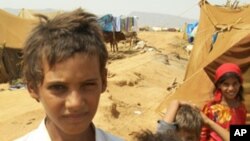The United Nations refugee agency warns it may be forced to suspend or reduce assistance programs to hundreds of thousands of internally displaced people in conflict-ridden northern Yemen in the next couple of months for lack of money. A senior UNHCR official, who has just returned from the region, says the agency's multi-million dollar appeal has fallen on deaf ears.
The UN refugee official describes Yemen as a tinderbox ready to explode. The UNHCR's bureau director for Middle East and North Africa, Radhouane Nouicer, says he took stock of the multiple threats facing the country during his recent visit.
He says the government is faced with a rebellion in the north and a separatist movement in the south. He says there are active pockets of terrorists scattered throughout the country.
In addition, he says declining oil resources have put the country into a precarious economic situation.
The UNHCR cares for more than 170,000 refugees, mainly from Somalia. Despite the declining economic situation and growth of xenophobia, Nouicer says Yemeni officials have assured him the government remains committed to the protection of the refugees.
However, the situation in the north is more difficult. The war between the al-Houthi militants and government has displaced about one-quarter of a million people.
Nouicer says only 30,000 of the homeless live in camps. The others are living with host families because land for campsites is very scarce.
"In Amran, for example, it is now months that we have been trying with the support of the local authorities and the central government to rent a piece of land where we can establish a camp. It has not been possible. Many families that have been provided with tents by UNHCR could not even find 10 square meters to erect their tents. The tribal situation is extremely tense and clearly many of the people in that governorate do not wish to have these IDPs [internally displaced persons] among them for a long period of time," Nouicer said.
A February 11 ceasefire agreed upon between the al-Houthi militants and the government appears to be holding. But Nouicer says it is premature for the displaced to return home. He says all basic services have collapsed and the ground must first be cleared of landmines.
He says operations to ensure the daily survival of the displaced and eventually help them return home are expensive to run. Unfortunately, he says the UNHCR has not received a single penny from international donors for the $16 million it needs this year.
"We have borrowed money from our operation reserve in order to cover the gap. But, we cannot continue to borrow money if there is no international response, or at least pledges towards this problem. At some stage, we might need to suspend our activities in Yemen or at least reduce some of the programs that we are undertaking," Nouicer said.
The UNHCR official says he is puzzled as to why the international community is not supporting its humanitarian operations. He says Yemen clearly is of strategic and political importance to many powers around the world and it is in their interest to ensure the stability of the country.
Aid Programs In Northern Yemen Under Threat
- By Lisa Schlein

International donors fail to respond to $16 million UNHCR appeal; refugee agency says conflict-ridden country on razor's edge













